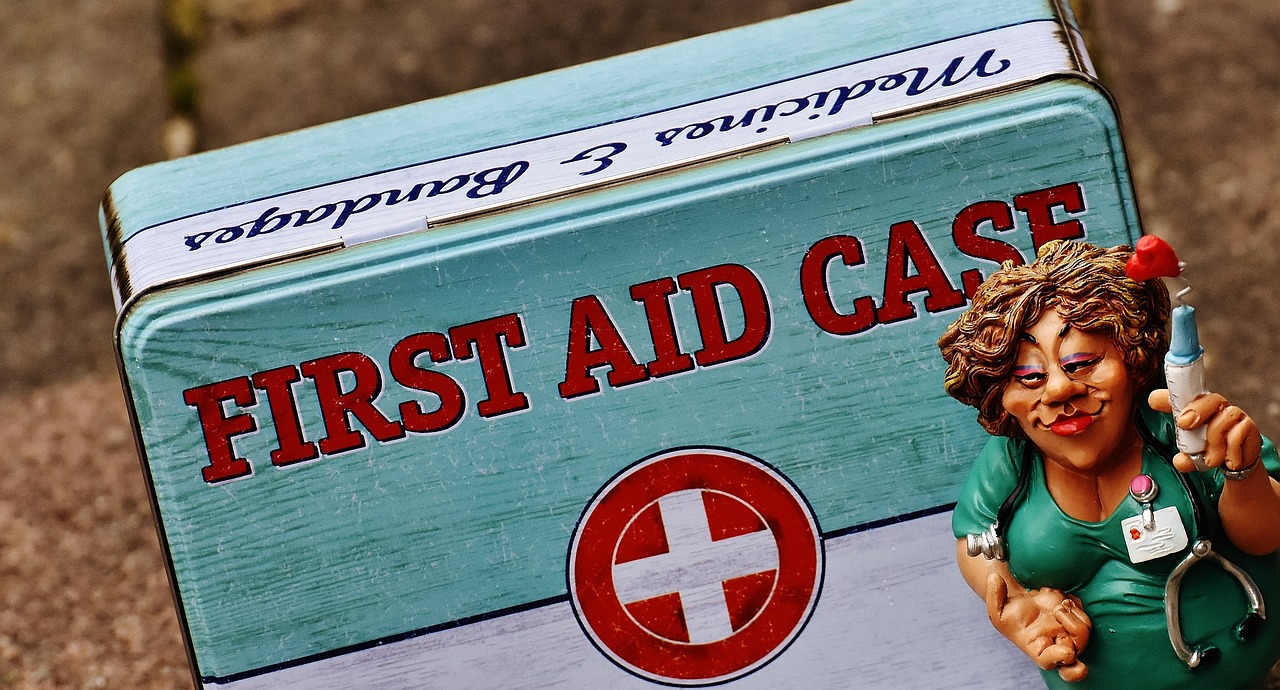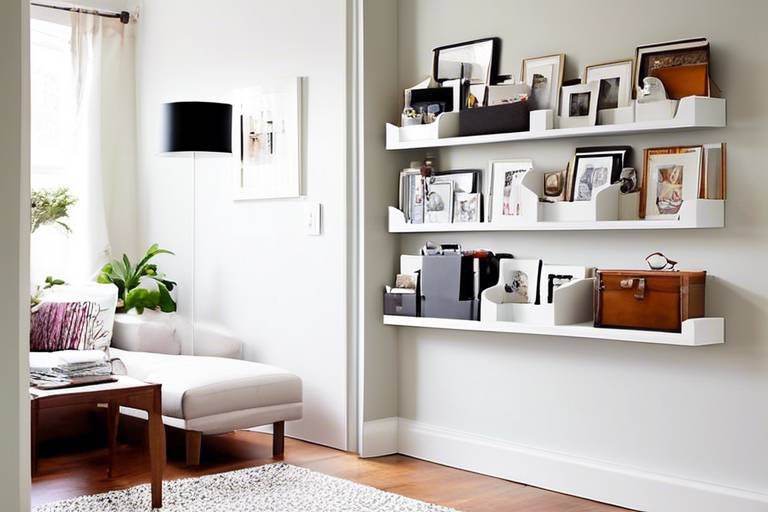Tips for Storing and Organizing Your Home’s Medicine
Proper storage and organization of medicines are crucial for safety and efficacy. Ensuring that your medicine cabinet at home is well-organized can prevent accidents and help you easily access the medications you need when you need them. Imagine your medicine cabinet as a well-arranged library where each medication has its designated spot, making it effortless to find what you're looking for in times of need.
One of the essential tips for maintaining a well-organized medicine cabinet is to check expiration dates regularly. Just like you wouldn't want to read a book that's past its prime, using expired medications can be ineffective or even harmful. By routinely checking the expiration dates of your medicines, you can ensure that you are only using medications that are safe and potent.
It's crucial to store medications in a cool, dry place to maintain their effectiveness. Think of your medicines as delicate flowers that need the right conditions to thrive. Heat and humidity can degrade medications, so it's best to keep them in a cool, dry place away from direct sunlight and moisture.
When it comes to childproof containers, think of them as the safety locks on your cabinet, preventing unauthorized access. Storing medications in childproof containers and keeping them out of reach of children and pets in a high cabinet or locked drawer can prevent accidental ingestion and ensure everyone's safety.
Separating prescription and over-the-counter drugs in your medicine cabinet is like organizing your books by genre. By keeping them separate, you can avoid confusion and ensure that the correct dosage is taken when needed. This simple organization can prevent mix-ups and potential medication errors.
To add an extra layer of safety, label everything clearly. Imagine labeling your medications as you would label different sections in a library. Clear labels with the name of the drug, dosage instructions, and expiration date can prevent mix-ups and ensure that medications are used safely and effectively.
Consider investing in a medication organizer with compartments for each day of the week. This organizer acts as a personal assistant, helping you keep track of daily doses and preventing missed or duplicate doses. It's like having a schedule for your medications, ensuring you stay on track with your treatment plan.
Remember to dispose of unused or expired medications properly. Just like decluttering your bookshelf, getting rid of medications you no longer need is essential. Safely dispose of any unused or expired medications following local guidelines or returning them to a pharmacy or designated collection site to prevent misuse or environmental contamination.
Lastly, keep a medication list to stay organized. Maintaining an updated list of all medications you and your family members are taking, including dosages and schedules, is like having a catalog of your library. This list can be shared with healthcare providers to ensure safe and effective treatment.

Check Expiration Dates Regularly
Proper storage and organization of medicines are crucial for safety and efficacy. This article provides practical tips to help you maintain a well-organized and safe medicine cabinet at home.
Expired medications can be ineffective or even harmful. Make it a habit to check the expiration dates of your medicines regularly and dispose of any that are past their prime.
When it comes to medication safety, staying vigilant about expiration dates is key. Just like a ticking time bomb, expired medications can lose their potency or, worse, turn into harmful substances. Imagine taking a pill hoping for a cure, only to find out it's as useful as a dud firework. To prevent such unexpected surprises, make it a routine to inspect your medicine cabinet regularly for any expired items ready to explode.
One effective way to keep track of expiration dates is by creating a simple list or table detailing the medications and their respective expiry dates. This visual aid can serve as a quick reference guide, ensuring you stay on top of your medication inventory and avoid any unwanted surprises.
Heat and humidity can degrade medications. Keep your medicines in a cool, dry place away from direct sunlight and moisture to maintain their potency.
To prevent accidental ingestion by children or pets, store medications in childproof containers and keep them out of reach in a high cabinet or locked drawer.
Organize your medicines by separating prescription medications from over-the-counter drugs to avoid confusion and ensure the correct dosage is taken.
Label all medication containers clearly with the name of the drug, dosage instructions, and expiration date to avoid mix-ups and ensure safe usage.
Using a medication organizer with compartments for each day of the week can help you keep track of daily doses and prevent missed or duplicate doses.
Safely dispose of any unused or expired medications by following local guidelines or returning them to a pharmacy or designated collection site to prevent misuse or environmental contamination.
Maintain an updated list of all medications you and your family members are taking, including dosages and schedules, to share with healthcare providers and ensure safe and effective treatment.

Store Medications in a Cool, Dry Place
When it comes to storing medications, ensuring they are kept in a cool, dry place is crucial for maintaining their effectiveness. Exposure to heat and humidity can lead to the degradation of medications, rendering them less potent or even ineffective. To prevent this from happening, it is important to store your medicines in an environment that is cool and dry, away from direct sunlight and moisture.
One effective way to achieve this is by storing your medications in a designated medicine cabinet or drawer that is located in a cool area of your home. Avoid placing them near appliances that generate heat, such as the stove or refrigerator, as well as areas with high humidity, like the bathroom. By keeping your medications in a cool, dry place, you can help ensure that they maintain their potency and remain safe for use.
If you live in a particularly humid climate, you may want to consider using desiccants, such as silica gel packets, in your medicine storage area to help absorb excess moisture. Additionally, keeping the original packaging of medications can provide an extra layer of protection against environmental factors that may compromise their quality.

Use Childproof Containers
Proper storage and organization of medicines are crucial for safety and efficacy. This article provides practical tips to help you maintain a well-organized and safe medicine cabinet at home.
When it comes to storing medications at home, one of the most important considerations is using childproof containers. These specialized containers are designed to prevent accidental ingestion by children or pets, ensuring their safety. By storing medications in childproof containers, you can have peace of mind knowing that your little ones are protected from potential harm.

Separate Prescription and Over-the-Counter Drugs
When it comes to storing and organizing your home's medicine, one essential tip is to separate prescription medications from over-the-counter drugs. This practice not only helps in avoiding confusion but also ensures that the correct dosage is taken at the right time. By keeping these two types of medications separate, you can easily distinguish between them and prevent any potential mix-ups that could lead to incorrect dosages or interactions.
Imagine your medicine cabinet as a well-organized pharmacy where each product has its designated place, much like how a chef organizes various ingredients before cooking a delicious meal. By separating prescription and over-the-counter drugs, you create a clear system that streamlines your medication routine and promotes safe usage.
Moreover, organizing your medicines in this manner can also be beneficial when seeking medical advice or in case of emergencies. Healthcare providers often ask about the medications you are taking, and having them separated makes it easier to provide accurate information quickly. It's like having a neatly arranged toolbox where each tool is easily accessible when needed.
If you have multiple family members using different medications, separating prescription drugs from over-the-counter ones can prevent any confusion about who should take what. It's like assigning each family member their own shelf in the refrigerator to avoid mix-ups and ensure everyone gets the right food.
By following this simple yet effective tip of separating prescription and over-the-counter drugs, you can enhance the safety and efficiency of your medication storage system. It's a small step that can make a big difference in maintaining a well-organized and safe medicine cabinet at home.
Remember, when it comes to your health and well-being, every little detail counts. So, take the time to organize your medications properly and enjoy the peace of mind that comes with knowing you are taking the right medicine at the right time.

Label Everything Clearly
When it comes to organizing your home's medicine, one crucial aspect is to . Proper labeling ensures that you can easily identify each medication and avoid any mix-ups that could lead to potential health risks. By clearly labeling each medication container with the drug's name, dosage instructions, and expiration date, you can maintain a safe and organized medicine cabinet.
Imagine opening your medicine cabinet in a rush, trying to find a specific medication, only to come across several unlabeled containers. The confusion and potential dangers of taking the wrong medication can be avoided simply by taking the time to label everything clearly. It not only helps you but also anyone else who may need to access the medications in your home.
One effective way to enhance the labeling process is to create a table listing all your medications with their corresponding details. This table can include columns for the drug name, dosage instructions, and expiration date, providing a quick reference guide for easy identification.
In addition to labeling individual medication containers, consider keeping a list of all your medications in a visible and easily accessible location. This comprehensive list can serve as a backup to the labels on the containers and can be shared with healthcare providers in case of emergencies or routine check-ups.
By taking the time to label everything clearly and maintain a detailed medication list, you are not only organizing your medicine cabinet but also prioritizing safety and efficiency in managing your healthcare needs. Remember, a little effort in labeling can go a long way in ensuring the well-being of you and your family.

Consider a Medication Organizer
When it comes to managing multiple medications, a medication organizer can be a lifesaver. Imagine having all your pills neatly organized in compartments for each day of the week, ensuring you never miss a dose or accidentally take a double dose. This simple yet effective tool can help you stay on track with your medication regimen and avoid any confusion or errors.
Think of a medication organizer as your personal assistant, reminding you when it's time to take your pills and keeping everything in order. With busy schedules and numerous medications to juggle, having a designated organizer can provide peace of mind and streamline your daily routine.
Not only does a medication organizer help you stay organized, but it also enhances medication safety. By clearly separating and labeling each compartment, you can easily identify which pills to take at what time, reducing the risk of mix-ups or missed doses. This visual aid can be especially beneficial for individuals taking multiple medications with different dosing schedules.
Investing in a medication organizer is a proactive step towards better medication management. Whether you're a caregiver responsible for multiple individuals' medications or managing your own health, having a structured system in place can simplify the process and ensure adherence to your prescribed treatment plan.

Dispose of Unused or Expired Medications Properly
Proper disposal of unused or expired medications is essential to prevent misuse and environmental contamination. Simply throwing them in the trash or flushing them down the toilet can pose serious risks. It is important to follow proper guidelines to ensure safe disposal.
One common method of disposing of medications is through drug take-back programs. Many pharmacies and law enforcement agencies host events where you can drop off unused or expired medications for proper disposal. This helps prevent these drugs from ending up in the wrong hands or contaminating water sources.
If there are no take-back programs available in your area, you can also dispose of medications at home. Mix the drugs with an undesirable substance like used coffee grounds or kitty litter, seal them in a bag or container, and throw them in the trash. Be sure to remove any personal information from the medication packaging before disposal.
Flushing medications down the toilet should be a last resort for certain drugs that are highly dangerous and could be lethal if ingested accidentally. However, this method should be avoided whenever possible to prevent water pollution and harm to aquatic life.
It's important to never share prescription medications with others, even if they have similar symptoms. Each medication is specifically prescribed for an individual's condition and may be harmful if taken without proper medical supervision. Always consult a healthcare professional or pharmacist if you have unused medications and are unsure how to dispose of them safely.

Keep a Medication List
Maintaining a comprehensive medication list is like having a roadmap for your health journey. It not only helps you stay organized but also plays a crucial role in ensuring your safety and well-being. By keeping a detailed record of all the medications you and your family members are taking, you can easily track dosages, schedules, and potential interactions. This information is invaluable, especially during medical emergencies or when consulting healthcare providers.
Creating a medication list doesn't have to be complicated. You can use a simple notebook, a dedicated app on your phone, or even a spreadsheet on your computer. The key is to include essential details such as the name of the medication, dosage instructions, frequency of use, and the prescribing healthcare provider. Additionally, it's beneficial to note down any allergies or adverse reactions to specific medications to alert healthcare professionals in case of emergencies.
Imagine your medication list as a personalized health dossier, offering a snapshot of your medical history and current treatment regimen. This document not only empowers you to take control of your health but also facilitates communication with healthcare providers. By sharing your medication list during doctor's visits or hospital admissions, you enable medical professionals to make informed decisions and provide tailored care.
Moreover, a medication list serves as a safeguard against potential medication errors. With multiple healthcare providers often involved in patient care, having a centralized list ensures that everyone is on the same page regarding your medications. This reduces the risk of duplicate prescriptions, drug interactions, or missed doses, ultimately enhancing the effectiveness of your treatment plan.
Remember, your medication list is a living document that should be regularly updated to reflect any changes in your treatment regimen. Whether starting a new medication, adjusting dosages, or discontinuing a drug, make sure to revise your list accordingly. By maintaining accuracy and completeness, you are taking proactive steps to safeguard your health and optimize the benefits of your medications.
Frequently Asked Questions
- How often should I check the expiration dates of my medications?
It is recommended to regularly check the expiration dates of your medications, at least once every six months. This practice helps ensure the effectiveness and safety of the medicines you are taking.
- What should I do with expired or unused medications?
Expired or unused medications should be properly disposed of to prevent accidental ingestion or environmental contamination. You can follow local guidelines for disposal or return them to a pharmacy or designated collection site for safe disposal.
- Why is it important to separate prescription drugs from over-the-counter medications?
Separating prescription drugs from over-the-counter medications is crucial to avoid confusion and ensure the correct dosage is taken. This practice helps prevent medication errors and promotes safe usage.
- How can a medication organizer help in managing daily doses?
A medication organizer with compartments for each day of the week can assist in keeping track of daily doses and prevent missed or duplicate doses. It simplifies medication management and promotes adherence to prescribed regimens.
- Why is it essential to keep a medication list?
Maintaining an updated medication list is important to share with healthcare providers for accurate treatment. It helps prevent drug interactions, ensures proper dosages, and enhances overall medication safety.


















